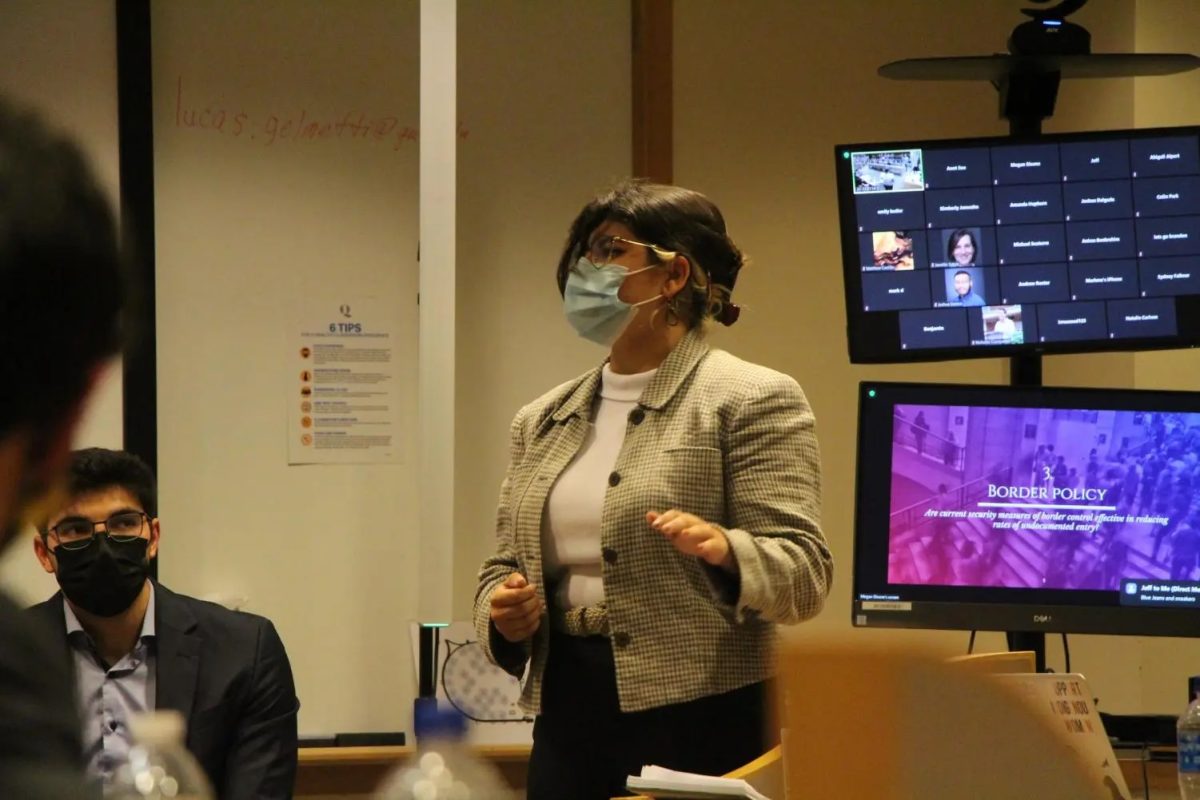Quinnipiac University students are required to take a few general education courses along with core classes that align with their major. This curriculum launched in fall 2015 and now, 10 years later, it is under review.
The University Curriculum integrates courses such as first-year seminar, first-year writing, mathematics, social science, humanities, fine arts and natural science. The courses allow students to gain an education outside of their desired major to expose them to different perspectives.
After a decade, a review of the University Curriculum is being launched.
Vice President for Academic Innovation & Effectiveness Annalisa Zinn believes that this curriculum is more than a set of requirements.
Zinn says that the curriculum is the heart. It’s how Quinnipiac professors and advisors prepare their students to be successful in their future by learning how to navigate through complex situations and respond to any challenges and opportunities that come up.
“This is a moment to think creatively about how we can design a general education experience that is not only distinctive to our institution, but also deeply relevant to the world our students are entering,” Zinn wrote in an email to The Chronicle. “It’s a chance to shape a curriculum that equips students with the intellectual tools, cross-disciplinary thinking, and adaptable skills they need to lead, contribute, and thrive after graduation.”
According to Zinn, it is Quinnipiac’s goal to ensure that the University Curriculum courses help students prepare for their future.
“We are in the early stages of reviewing the UC,” Director of General Education Jill Fehleison wrote. “Our initial focus will be on what students need from their general education and what structure would best deliver the curriculum.”
Many other colleges and universities are looking to change, or have already changed, their curriculum as well.
According to Fehleison, most schools regularly review and revise their curriculum based on assessment and the needs of the students
The University of Connecticut is implementing a new common curriculum this year for all first-year and readmitted students for leadership and global citizenship.
State-level legislative actions in Ohio, Utah and Florida are reshaping the general education requirements to focus on civics and Western civilization. They are also banning specific gender and race courses.
First-year occupational therapy major Alexia Pawlow finds the university curriculum courses at Quinnipiac to be useful, for the most part.
“I think that the basic math, English and science courses are necessary to take, because they are common skills that go into your everyday life as an OT,” Pawlow said. “However, being forced to take a film, or criminal justice class doesn’t relate to my major whatsoever, so in a way I feel it’s pointless.”
Pawlow also mentioned how English is an important course that she would take, even if it was not necessary. She believes you must know “how to dissect articles” to understand what people say in any major or field.
First-year applied business major Megan Barnes had a different take than Pawlow.
“I think that the University Curriculum should not be required because if we are paying for our courses then we should be able to choose what classes we want to take,” she said.
Senior interdisciplinary studies and special education major Kayla Dupper had a different opinion; she believes that university curriculum is important and the building block for her future career.
“Learning different subjects and topics helps me develop a sense of comfort as I know I will be dealing with all subjects in the future,” Dupper said.
Although Dupper finds the curriculum important, she worries that it may affect and not co- interact with her specific major classes that are necessary for graduation. Besides this, she finds general education necessary for the improvement of academics and skills.
“General education improves people’s academics and real world skills by improving their ability to understand and communicate effectively with others in any field,” Dupper said.
Quinnipiac’s curriculum blends a mixture of foundational knowledge and skills that are needed to succeed in future careers and adapt quickly to different situations and environments.
The curriculum consists of 15 core courses or 46 academic credits that must be taken throughout your undergraduate experience.
“I think the Quinnipiac University curriculum is well organized and helps students build useful skills. It seems balanced, with a mix of core classes and classes focused on each individual major,” Sebastian Thomas, a sophomore finance major, said. “Overall, Quinnipiac University’s plan supports students in learning and preparing for their future careers.”
Students have a wide variety of different classes they can take to fulfill these credits, providing students with many options to pick classes they are genuinely interested in.
Junior psychology major Melia Peragine was undeclared in the College of Arts and Sciences for almost two years. The university curriculum allowed her to explore random classes and majors while still getting the necessary credits.
“Though this benefitted me, I know people who knew what they wanted to pursue and hated that they had to take random classes just to fill credit. To better prepare people for their future careers, having a hands-on requirement could help (internship, volunteer, certification),” Peragine said.
We will have to see what changes, if any, come from the review of classes being conducted.







